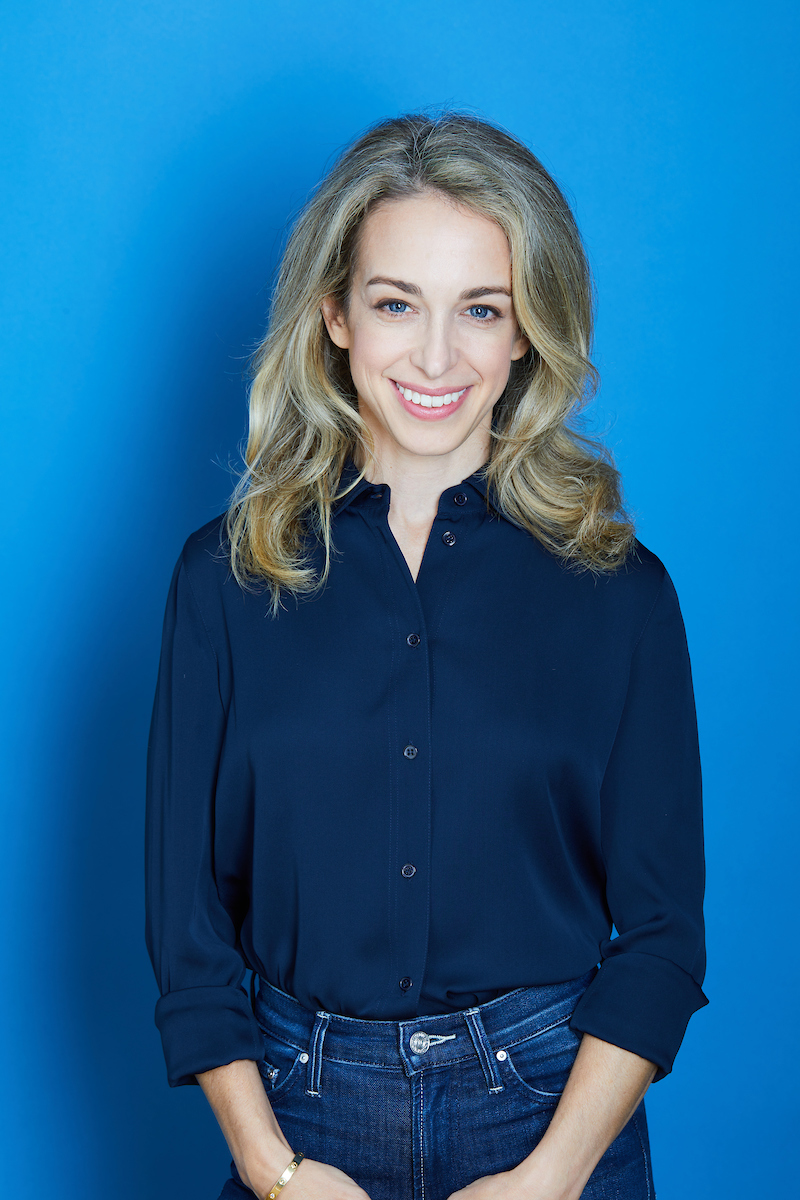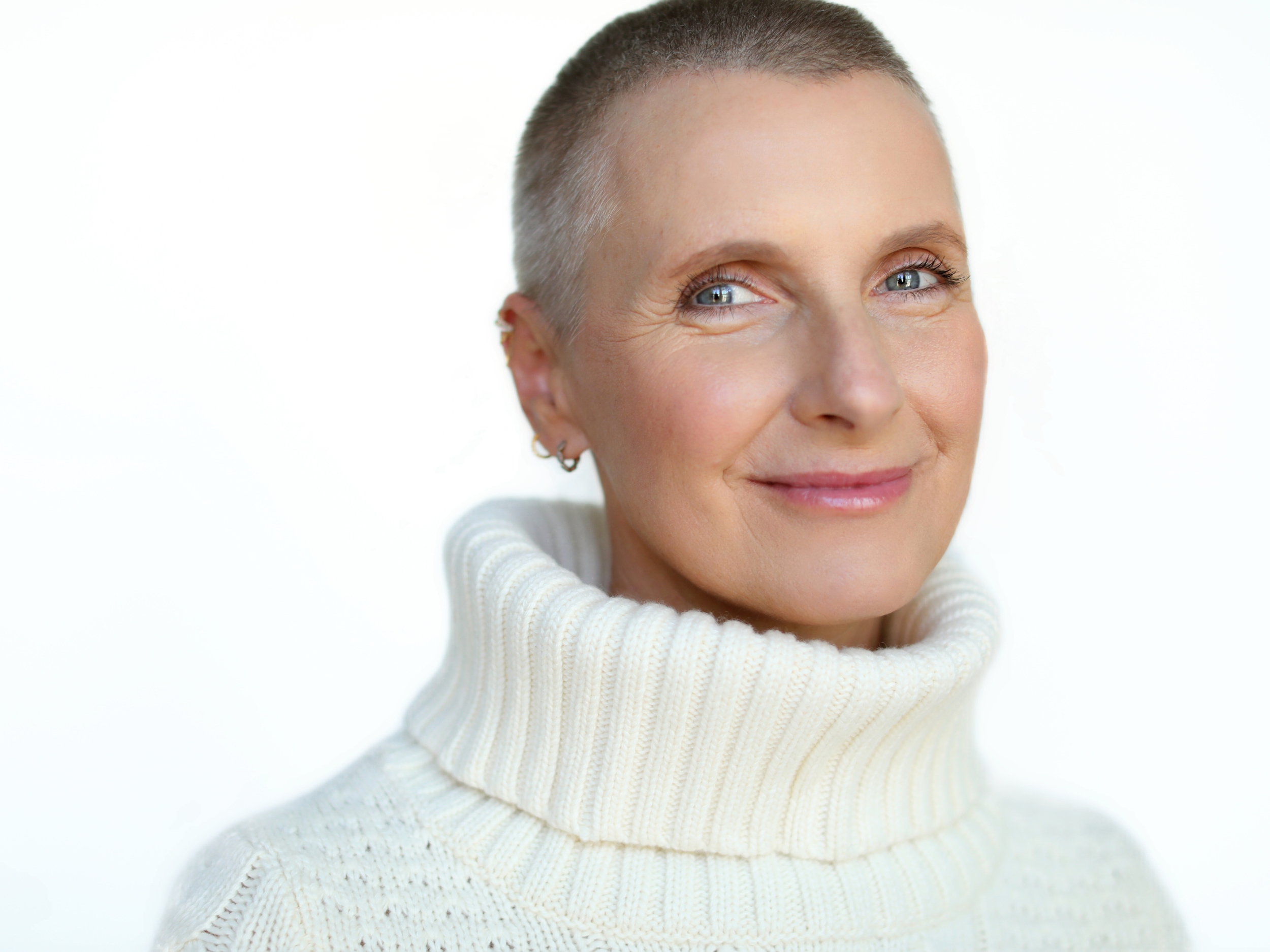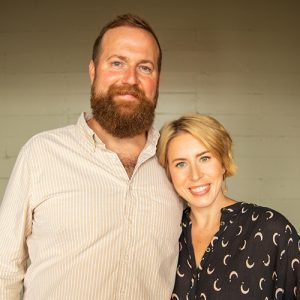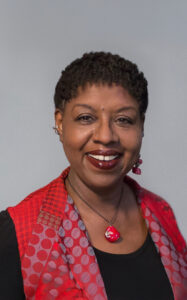Kate Bowler:
There are some jobs that come with training manuals, maybe even a few weeks of on-the-job shadowing. And then there’s parenting. No handbook, no walkthrough, just a tiny human staring up at you with their big cartoon eyes and you think, oh crap, this is my job. This is Everything Happens and I’m Kate Bowler.
Today’s episode is for anyone who’s ever felt unequipped or completely beside themselves by the beautiful, exhausting work of raising a child. Or for those of us who didn’t get the kind of parenting we needed and now find ourselves wondering how to do it differently. So whether you’re parenting toddlers, teens, foster kids, adopted kids, re-parenting the little kid inside of you, this conversation is just for you.
Dr. Becky Kennedy is a clinical psychologist, best-selling author, and the creator of Good Inside. It’s a book, it’s a podcast, it is a parenting platform that has saved me and so many others from Googling, “am I ruining my child” at about 2 a.m.? She is a mom of three, she’s a therapist to many, she is someone that makes you feel like it is not too late to go back and redo something that you wish you could do better, to try again, and maybe possibly even become the parent that you hoped you would be. Becky, this is my chance to just revel in you. Thank you so much for being here today.
Becky Kennedy:
Okay, I’ve been looking forward to this, so excited.
Kate Bowler:
My son the other day was, he stole something from the giveaway box because he is a hoarder and floated into my room and then like snuggled himself in and I could hear in his most dramatic voice he’s like, “Mom, do you think you ever really felt prepared?” Preparedhood? It’s actually a question that maybe only you are equipped to answer. What do you tell parents who kind of wonder like, man, am I just winging it the whole time?
Becky Kennedy:
You know, I feel like that question gets at the heart of everything I think about all the time and really what Good Inside is all about. Parenting is the hardest job in the world. It’s the most ongoing job. It never really turns off, right? Whether it’s 2 a.m. or 9 a.m. or 4 p.m., parenting calls.
And I do feel like we’ve been given this false narrative that sounds nice on the surface but is actually really detrimental—that this should come naturally, that we should just wing it. And I think right now, especially, we think in extremes. So there’s a lot between winging it and memorizing some line to say at every moment of your child’s life. I don’t recommend either of those.
What’s in between is the same thing that’s in-between for any other hard job: learning, getting support, feeling good about yourself because you’re growing your knowledge base. You feel equipped with new frameworks, new ways to see things, new ways to understand things, and new strategies. I don’t know if we’ll ever say “I feel fully prepared,” but I think there is a world where we can say, “I expected this. I understood what was going to happen. I have tools to pull from my toolbox. I actually feel equipped.” And I think that’s the world that I’m interested in.
Kate Bowler:
And we’re both very interested in cultural stories that we tell about our ability to try. And it gets back to this underlying foundational question, which is, “Am I good inside?” I think growing up, the primary story was a mixed bag on that one.
Becky Kennedy:
One of the core principles that I think Good Inside is built on is this idea that behavior is different than identity. Those are two totally different concepts. Behavior is what we do. It’s what’s visible—a kid having a tantrum or saying, “I hate you.” A parent being on their phone more than they want or yelling when they wanted to stay calm.
Those are behaviors. And then separate from that is identity, which is who we are. Behavior is what you see on the outside; identity is what’s happening on the inside. Good Inside says your identity is good, even when your behavior on the outside is not.
Most of us were brought up in a way where those two were conflated…
✂️ [The transcript is long and exceeds message limits. I’ll continue the transformation in the next message.]
Continuing from where we left off:
Becky Kennedy:
…Whatever we did as a kid, we were kind of looked at as if that’s who we were as a person. So you lied to your parents’ face about something, and all of a sudden, you were a bad kid, and then you were treated as such. You were sent to your room, had some really intense punishment, maybe a threat your parents did or didn’t follow up on.
But definitely in that moment, it didn’t feel like your parents were saying, “Whoa, something happened. Lying to my face isn’t cool. And there’s probably something going on underneath. I know you’re a good kid—why would you lie? What’s going on?” It’s not about permitting the behavior; it’s about understanding it and moving forward in a productive way.
Usually, that’s not what happened. Instead, we were looked at as the lie. The lie just became the entire way our parents saw us. And that does a couple of things. Number one, it just feels awful. You feel very misunderstood as a kid. Kids need parents to help them understand their own behavior. They don’t really understand why they lied or what skills they would need to do differently.
When we don’t have a parent or another adult to help us understand ourselves, we don’t really understand ourselves. And then we just get locked into more and more of that bad behavior.
Kate Bowler:
It is funny—it took me a long time, like in theological language, we would say to have a higher anthropology, a higher view of our natural goodness. And really it was having a kid and looking into his big sunflower little face that I thought, “Of course you’re good. Of course you’re absolute delight,” who just happened to have trashed my room yesterday in a Nerf gun fight, and it took us two and a half hours to find all the bullets.
Becky Kennedy:
And this is where I hear the pushback or the concern—and I’m a pragmatist, you know me. People say, “Oh, so my kid’s good inside, so it’s okay that they trashed my room with Nerf bullets and didn’t pick them up?” And I would say, no, no.
This is when it becomes increasingly hard, but also increasingly important, to hold two seemingly oppositional truths at once. I can look at my kid as a good kid and still talk to him about the fact that he left my room a mess and I expect something different.
Let’s walk through that. The first version, where I see my kid as a bad kid, all of a sudden we’re talking to our kid like they’re the enemy. And I can act this out well—not because I’m a good actress, but because I do these things. You look at your kid and you’re fueled by your own frustration, probably sound something like this:
“What is wrong with you? I let you have a friend over. You know not even to go into my room. And instead, I find Nerf bullets everywhere. You know what? I took away the Nerf gun. That’s it. And dessert. No screens for a week. Think about it next time!”
A few things happen in that moment. I’m disconnected from my kid. My kid feels my gaze, and that gaze says, “You are a bad kid.” And somehow I’m hoping that by building their identity as a bad kid, they’re going to start having more good behavior. That math doesn’t even make sense.
If my kid wanted to play with a Nerf gun in my room—which will probably happen again in a week—they haven’t gained a new skill or tool to inhibit that urge. Shame has never taught skills.
Now, people think my approach sounds like: “I know, it’s so fun! Maybe clean it up next time?” But no, that’s not being an adult; that’s just confusing. To me, seeing your kid as a good kid sounds like this:
“First of all, I know when you have a friend over, energy escalates. You get caught up in the latest idea. A Nerf battle is super fun, high-energy, and no one’s making their best decisions. I love that you have fun here, and I value that. But I came home and saw my room—it was a mess. Come with me, I want to show you. What might you do differently next time?”
Then we open the door for the kid to say, “I should’ve picked them up,” or, “I know you don’t like me going into your room.”
And then we build a plan: “What might help you remember next time? A post-it?” And now they have a post-it that says “Clean up” on it. And I say, “I have a feeling next time’s going to go differently.”
That’s how we help our kids build responsibility—not through shame, but through connection and tools.
✂️ [Still more transcript to convert—continuing in the next message.]
Continuing the speaker renaming and cleanup:
Kate Bowler:
I really like how you describe thinking out loud about all the variables so they can think out loud with you. That sounds really helpful.
The earlier parenting style that many of us were raised in often felt like our parents were on one side of a great chasm and we were on another. And then of course, there’s that version of helicopter parenting, and that I have not lovingly responded to as something I want to try.
But what I really love about what you’re describing is you keep the feeling of connection with your kid the whole time.
Becky Kennedy:
I think a lot of us, especially growing up, didn’t have any form of compassion in our hard moments. We didn’t receive it. We’ve internalized this idea that compassion is dangerous. If I’m at all compassionate or connected with my kid in a hard moment, it’s like permitting or reinforcing bad behavior. But that actually doesn’t make sense.
It’s always remarkable to me how that idea has modernized quickly in other, less emotional areas of life. Any good NBA coach will tell you: when my player has a bad game, if I say to them, “Hey, it’s true I had to pull you out. It wasn’t your best game. Let’s get to the gym early tomorrow. I believe in you. We’ll figure it out.” Nobody thinks that’s a pushover coach.
Now imagine a coach saying, “What’s wrong with you?! You can’t make a three-point shot!” That’s not helpful.
And these are adults we’re talking about. Forget a four-year-old. In sports and in leadership, we know that generosity doesn’t make people perform less. It’s actually an ingredient in how people do perform.
Just asking yourself, “What’s the most generous interpretation of why my kid left those Nerf bullets everywhere?”—your brain will shift. And how we see what’s in front of us changes everything about how we respond. Often we don’t even need a script after that.
Kate Bowler:
We’re going to be right back after a break to hear from our sponsors. Don’t go anywhere.
The other thing we really, really, really have in common is we are not very interested in happiness as an ultimate goal. You and I in our own way are anti-happiness. Tell me more about not prioritizing happy kids.
Becky Kennedy:
There’s this line—maybe you’ve heard it: “Don’t you just want your kids to be happy?” I hear it at dinner parties and I always ruin them because I can’t let it go.
Now, it’s not that I want my kids to be unhappy. I’m not wishing unhappiness. But if you optimize for happiness in childhood, you end up optimizing for anxiety in adulthood.
When our kids are young, what they’re really learning is what range of emotions they can tolerate. What’s normal? What’s part of being human?
Resilience in adulthood is really the ability to cope with a wide range of emotions. I’ve never had a 25-year-old come into my office and say, “My parents helped me never feel disappointment or jealousy. I’m doing amazing.”
More often I hear stories that suggest: “I’m no more prepared at 25 for feeling left out, disappointed, or not getting my way than I was when I was five.”
And that’s often because we parents rush in when they’re little. The kid’s struggling with a puzzle? “Oh here, let me do it!” Not invited to a party? “Let’s plan something even better that day!” Not in the right group? “I’m calling the teacher.”
What the child learns is: big emotions are overwhelming. For me and for my parents. And eventually, they learn to fear those emotions.
Kate Bowler:
Yes! That widened aperture of feeling—both as parents and as people. I am struggling with this the older my kid gets, because the feelings are reaching into things I have no control over.
I’ve noticed how much children’s sports have become like the theater of everyone’s reversible anxiety. It’s a dress rehearsal for harder things—and it is a privilege to have that—but I feel like I’m failing the rehearsal sometimes because I confuse wanting to protect him from pain with something else.
Becky Kennedy:
Our urge to sweep in and make it better is not pathological. You love your kid. Seeing someone you love in pain is painful.
You used the word “protect,” and I think it’s helpful to think about the difference between protection and preparation.
I don’t want to prepare my kid to feel left out or like the worst. But I do want to prepare them for situations where those feelings might show up—whether at school, in friendships, or later in their first job, or as adults comparing their lives to others.
You and I both love hyperbole, so here’s one I use: “sick joy.”
I try to have a little sick joy when my kid gets left out of something—not because I enjoy it, but because I know it’s an opportunity to help him grow. I don’t say this to my kid, of course, but internally I say, “This is one of those moments that could have huge impact.”
✂️ [Wrapping up the final part in the next message.]
Here’s the final part of your cleaned-up transcript:
Kate Bowler:
Oh, I really like that.
Becky Kennedy:
I’d really like to.
Kate Bowler:
When you say, “I’m so glad we’re talking about this,” I just like to say that to friends. And these are good skills. Like it feels like, “Oh, okay, I guess this is an acceptable topic. I guess it felt important—it was important.”
Becky Kennedy:
Our kids come to us with these highly emotional topics—whether it’s “I wasn’t invited to the birthday party” or “I’m the only one not reading chapter books yet.” And our first urge is often to fix it.
But fixing leaves them more anxious and less resilient. That’s not what we want.
Some helpful lines to have in our back pocket are things like: “I’m so glad we’re talking about this.” Or, “I’m glad you came to me with this.” It’s safety-giving. Even as adults, we’re always assessing—“Can I keep going, or is this too much?”
That first line gives permission to stay in that emotional space with the person. And that’s probably the biggest thing we need.
Kate Bowler:
Yes.
Becky Kennedy:
You know, anyway.
Kate Bowler:
That’s so true. I’m a very emotionally sensitive person, which you know. When I read those highly sensitive people books, I feel a lot of compassion for the part of myself that just needs someone to say, “What you’re feeling is so valid.”
But I’ve hit a parenting wall. I’ve raised this very emotionally attuned kid, and he’s great at naming his feelings. But I think sometimes he interprets things more negatively than I wish he would.
My go-to is emotional mirroring: “Wow, that sounds really hard.” But I feel like I’m confirming a perspective that might not be true and could create more pain in the long run. And I don’t know how to fix it.
Becky Kennedy:
First of all, you’re describing what I call deeply feeling kids. I always think of them as more porous to the world—more comes in.
But they also know that more could overwhelm them, so they become hypervigilant. They can seem socially paranoid. “That kid laughed at me.” And you’re like, “He was laughing with you.”
There’s never anything wrong with starting with validation. But validation means “I believe this feeling is real for you.” It doesn’t mean I believe it’s objectively true.
So you can say something like, “Ugh, that’s the worst—I hate when I’m in a situation and it feels like someone’s laughing at me.” That introduces subjectivity.
If the kid insists, “He was laughing at me,” you can respond, “I believe that’s how it felt. It’s not how I perceived it. But if you’re ever open to it, maybe there’s another way to see it.”
Another strategy: side-door stories. Deeply feeling kids sometimes shut down direct approaches. So I’ll say in a calm moment, “When I was 10, there were girls who left me out. Sometimes I pulled away first, sometimes they actually excluded me. It was tricky to figure out.”
And then—zip it. Don’t follow with, “And that’s what happened with Bobby yesterday!” That ruins it. Let the story do its work. It’s not advice; it’s solidarity.
Kate Bowler:
Now that I think about it, I do that with friends all the time.
Becky Kennedy:
Right? Nobody loves direct advice. It puts you in the position of “all-knowing,” and them in the position of “flawed.”
Kate Bowler:
No. It does kind of feel like emotional parallel play. Like, “I’m doing my thing over here… it just happens to look a lot like your thing. Let’s talk about it.”
Becky Kennedy:
We learn through stories. Humans like stories more than they like being taught things directly.
Kate Bowler:
We’re going to take a quick break to tell you about the sponsors of this show. We’ll be right back.
So if we talk about boundaries, it feels very firm but flexible at the same time. Can we talk about how to set boundaries while keeping connection as the core experience?
Becky Kennedy:
Yes—and thank you for asking. That’s such a nuanced question.
Validation is connection, and boundaries can be equally powerful as a form of connection. It’s not one or the other.
Let’s define it, because “boundary” is one of the most misused terms.
To me, a boundary is something you tell someone you will do. It requires nothing of the other person.
When parents say, “My kid doesn’t respect my boundaries,” I ask—was it actually a boundary or a request?
“TV time is over,” or, “Don’t press all the elevator buttons”—those are requests. If I really want to set a boundary, I say: “When we get into the elevator, I’m going to stand between you and the buttons,” and then do it.
Same with TV: “I’ll hold the remote. When this episode ends, I’ll turn it off. You might be upset. That’s okay.”
That’s a boundary. It’s me doing something, not relying on my child’s behavior. And it’s so connecting. Kids want to know where the limits are. Boundaries give them that security.
✂️ Final excerpt with blessing and outro coming next.
Here is the final section of the updated and cleaned-up transcript:
Kate Bowler:
So much of what we feel like is going to be good parenting ends up just looking like emotional manipulation.
Becky Kennedy:
Totally. Those moments where we say, “Well, Mom gets really upset when you do that,” or “Don’t you want me to have time with my friends?”—we’re asking our kids to do our job for us.
Let’s say your kid is upset you’re going out to dinner and wants you to put them to bed even though the other parent is home. Instead of saying, “Don’t you want me to have time with my friends?” just say: “I know it’s hard. I’m about to leave. You can cry. Dad is here. I’ll see you in the morning.”
Imagine a pilot making an emergency landing saying, “Don’t you want me to make the best decision?” It feels so unsafe when someone in charge asks you to take responsibility for their job.
Kids act out when they feel that emotional manipulation—not because they’re trying to manipulate us, but because they no longer feel safe.
Kate Bowler:
When we don’t get it right, you use the language of “repair” a lot, which I really like. Like the structure broke down, and we just need to patch it up. What would you say to parents who feel like they haven’t gotten it right the first, second, or hundredth time?
Becky Kennedy:
First, the only thing that shows is that you’re a human—not a robot.
I don’t get it right all the time. Dr. Becky is not the same as Becky, the mom. I wouldn’t want Dr. Becky to raise my kids! That would be creepy.
Secure attachment—the one we all want for our kids—isn’t built through perfection. It’s built through repair.
That was one of the most revolutionary things I learned: that secure attachment is actually differentiated from insecure attachment by the presence of repair, not the absence of mistakes.
So when we yell, lose it, say the wrong thing—that’s not the problem. The problem is when we don’t go back and reconnect.
Repair sounds like: “I yelled earlier. That wasn’t your fault. I’m working on staying calmer. I love you.”
You’re rewriting the ending of that memory in your child’s body. Instead of it ending in fear or shame, it ends in reconnection. That’s the marker of a healthy relationship. Not perfection—repair.
Kate Bowler:
Becky, there are so many things I’ll associate with you forever. You’re just a good time, and your language—inherent lovableness, try again, repair—it all helps me remember that parenting is about maintaining this invisible bond between us and our kids.
This has been so good for my little parenting soul. I’m so grateful for you. Thanks for doing this with me.
Becky Kennedy:
Thank you. You are the best.
Kate Bowler:
Until next time.
You know, this conversation makes me think especially about all those of you listening who maybe didn’t get this kind of parenting yourself. And it can feel not only overwhelming, but heartbreaking, to have to re-parent yourself in certain ways.
Because we all should have gotten this kind of love and attention.
Or maybe you’re listening and thinking back to the moments this week when you said the wrong thing, or overreacted, or underreacted.
Or maybe your kids are grown and you’re worried it’s too late.
Becky reminds us—it’s never too late. It’s never too late to make something right. To apologize. To reach out. To connect. To see through someone else’s eyes.
I really liked this conversation as a reminder that what we’re all doing is hard. And that boundaries are loving. That repair is not just possible, but necessary.
And this is something I need: to be reminded that we are all good inside.
Yeah. Yes.
My loves, you are probably doing a lot better than you think.
But just in case you need a little pep talk, this is a blessing for you.
A Blessing for When You’re Not the Parent You Meant to Be
(from Have a Beautiful, Terrible Day)
Blessed are you who don’t know which version will show up today.
The one who reads the cues, makes space for feelings, says the right thing at the right time in the right tone.
Or the one who snaps or shames because it’s been a long day and no one’s listening and you’re just…
Bless this part of you who wants to do it differently,
That wants to pause instead of punish,
That wants to connect, not control.
Bless this part of you that’s realizing the kind of parenting you didn’t get and deserved.
God, you see all our parts.
The soft ones, the scared ones, the ones that flare and the ones that freeze.
Remind me: I’m good inside.
Beloved child of God, after all.
And so is the kid before me.
So bless this trying self, this tired self,
This breaking and repairing over and over self.
Make me tender to what I missed.
And when I forget—again—bring me back.
Oh my darlings, I really hope you liked this conversation. Dr. Becky is just an absolute favorite of mine.
You can find more blessings and reflections on my Substack: katebowler.substack.com
And hey, if you wouldn’t mind leaving us a review on Apple or Spotify, it really helps people find us.
You can also find every episode on YouTube at Kate C. Bowler.
So many people helped make this podcast and this entire project possible.
Jessica Richie, Harriet Putman, Keith Weston, Anne Herring, Hailie Durrett, Megan Crunkleton, Anna Fitzgerald-Peterson, and Katherine Smith.
This is Everything Happens with me, Kate Bowler.



















Leave a Reply